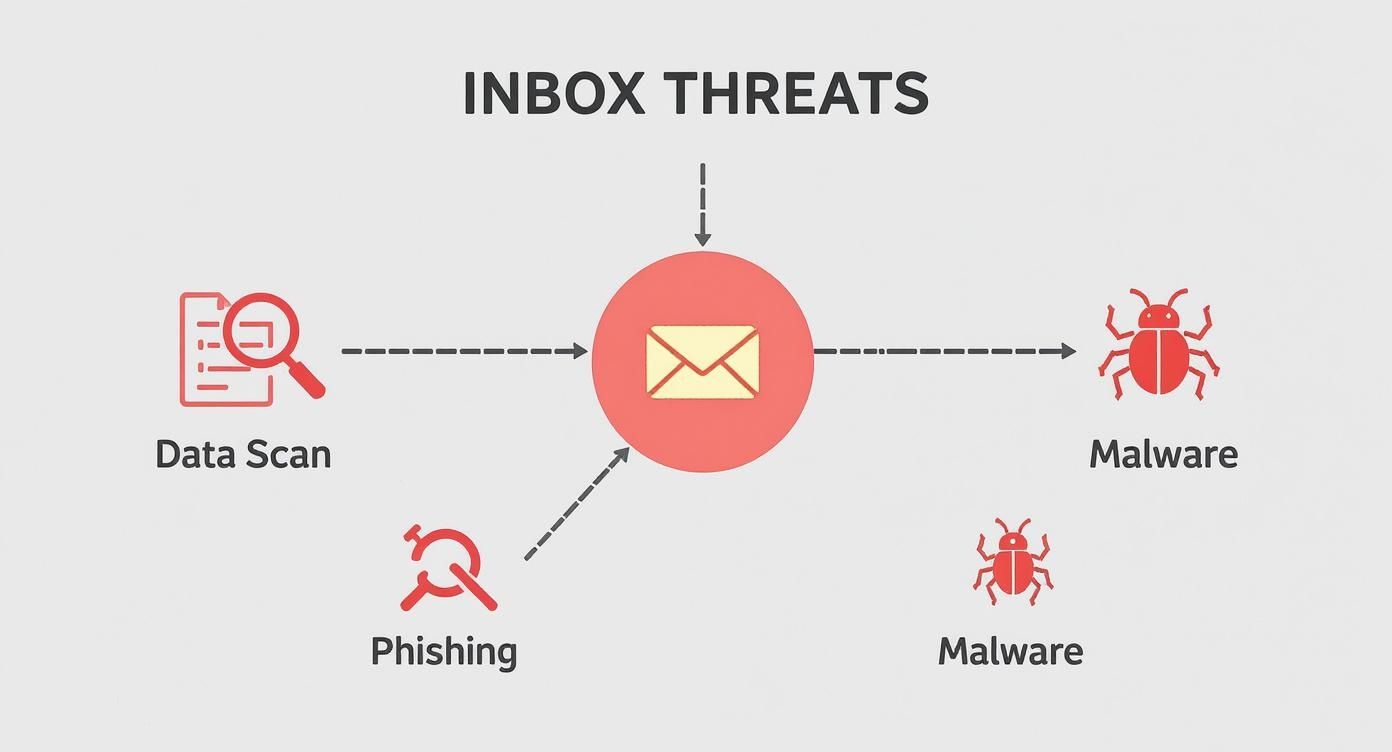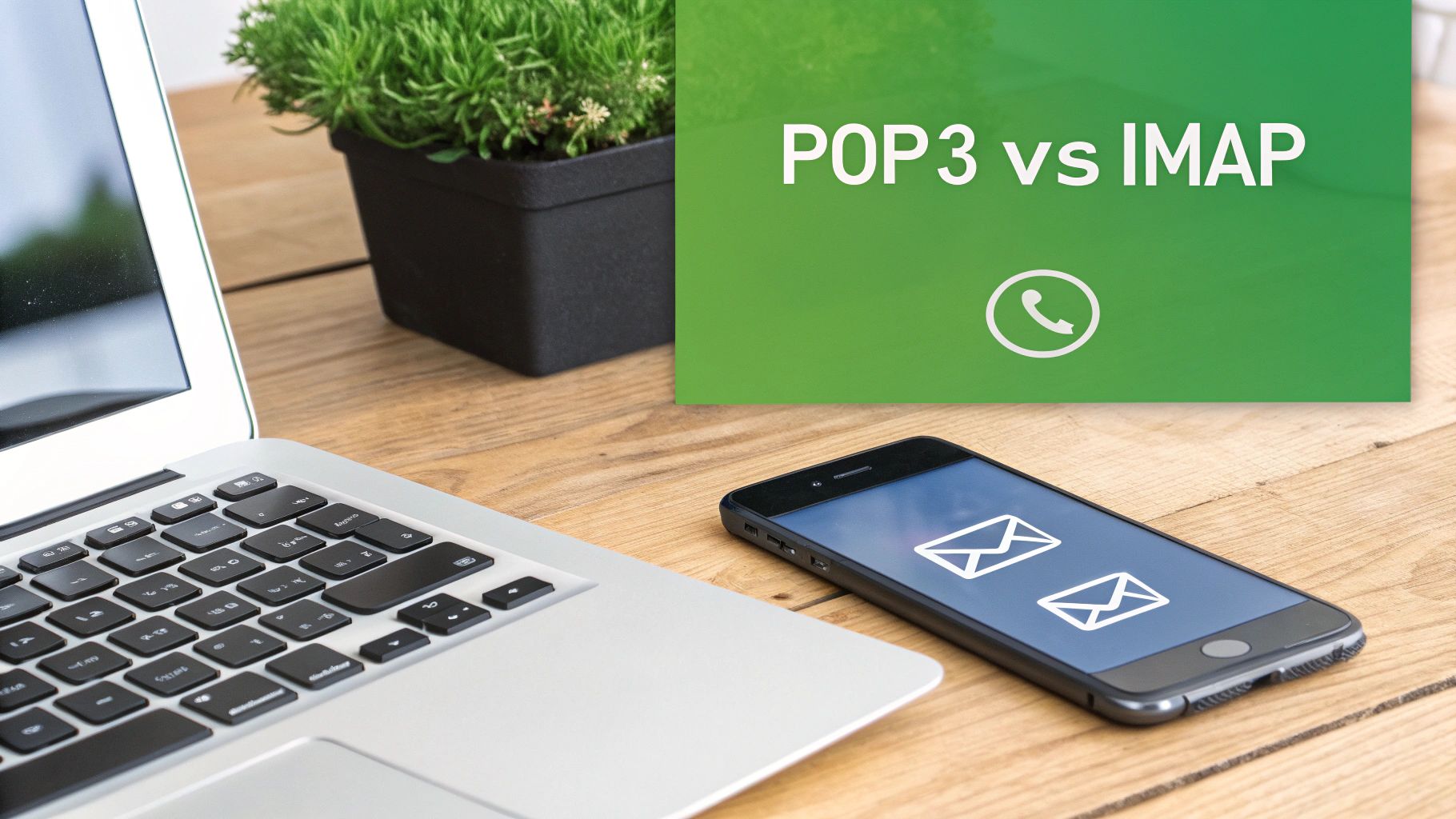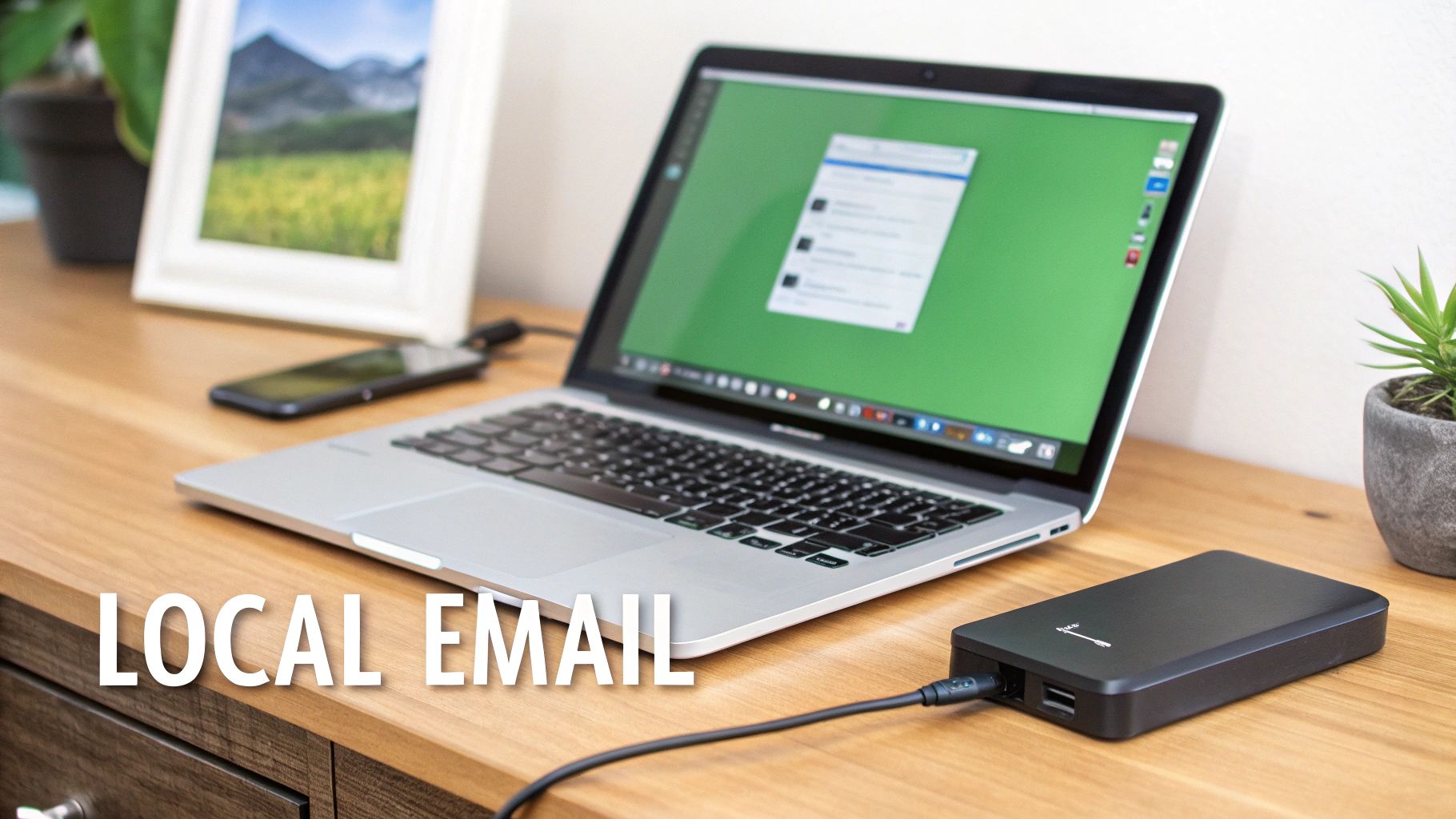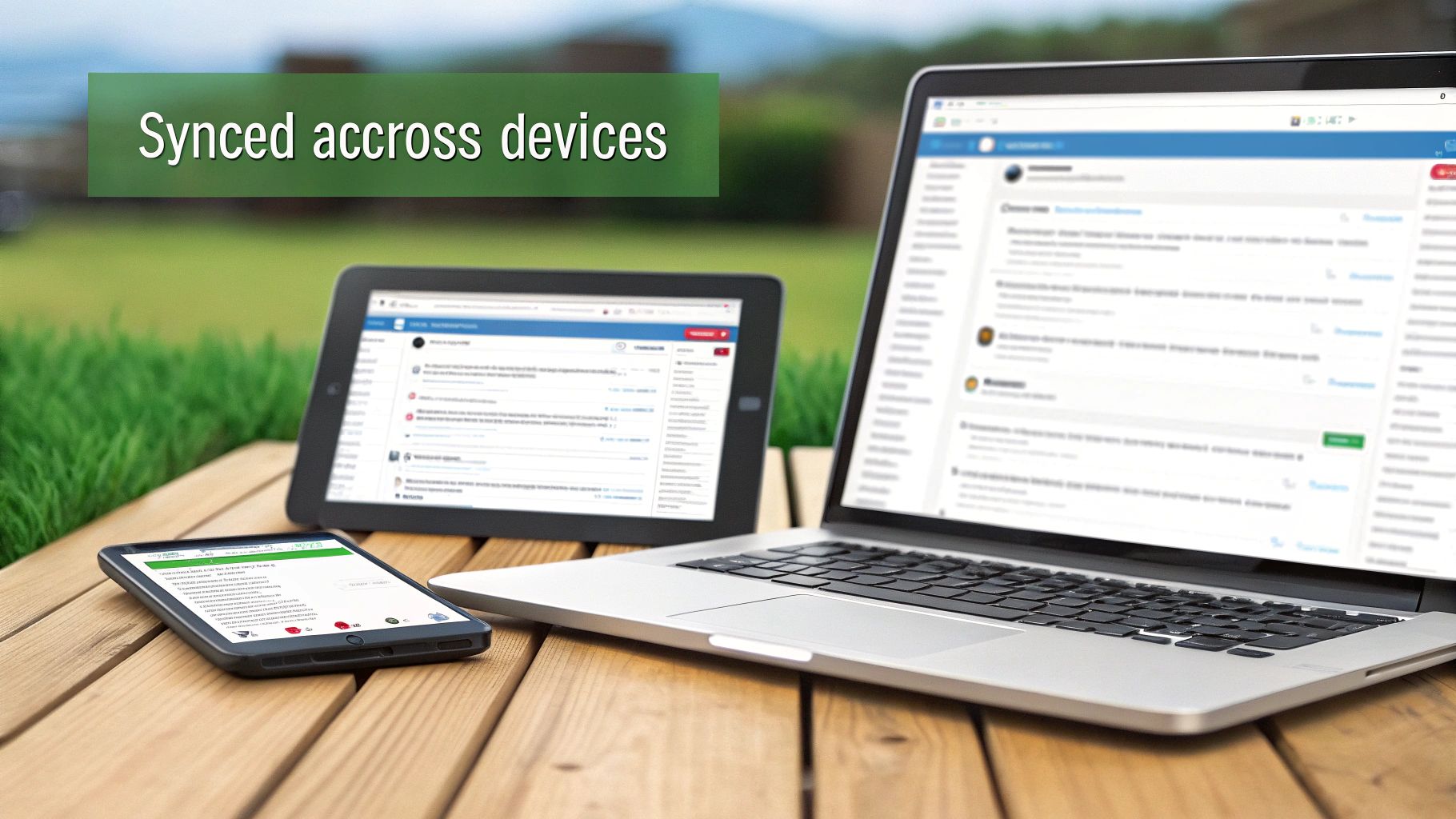Most of us take email for granted. We treat our inbox like a digital vault, assuming the conversations inside are for our eyes only. But here’s the uncomfortable truth: email privacy isn't a given. It requires a conscious effort to secure your communications, especially when choosing a hosted email platform.
Think of a standard email like a postcard. As it travels from you to its recipient, anyone along the way can get a peek at its contents. Securing your email isn't an automatic feature—it's a deliberate choice you have to make, starting with understanding the difference between email privacy and email security.
Why Your Email Isn't Private by Default

Stop and consider what you send over email. Financial documents, medical results, sensitive business deals, and deeply personal conversations all live in your sent folder. We operate on faith, assuming these messages are private. In reality, the very design of many free hosted email platforms leaves that information wide open.
This isn't just a hypothetical risk. Major email providers often scan your messages to build incredibly detailed advertising profiles. Your private data becomes their business model. On top of that, your emails often sit unencrypted on their servers, vulnerable to anyone from curious employees and government agencies to hackers who find a way in. This is a failure of both privacy and security.
The Growing Demand for Secure Communication
People are waking up to these risks. In fact, 2024 was a brutal year for cybersecurity, with a staggering 5.5 billion accounts compromised around the world.
This has created a huge push for better email security. The global market for email encryption is on track to hit USD 11.9 billion by 2025. This isn't just a niche trend; it’s a clear signal that individuals and businesses are tired of their communications being exposed on insecure hosted email platforms.
The core problem is simple: when a service is free, you aren't the customer—you're the product. The data mined from your inbox is how these companies make their money.
Privacy Doesn't End in the Inbox
Thinking about email privacy needs to go beyond just the messages themselves. What happens to your data on your actual devices, long after an email has been read and archived?
True digital security means considering the entire lifecycle of your information. For example, guides on data destruction as a fundamental aspect of information security show just how critical it is to make sure sensitive data can't be recovered from old computers or hard drives. It's all part of the same puzzle.
The Hidden Threats Lurking in Your Inbox
Your inbox is more than just a place for messages; it's a digital record of your life, and plenty of people want a peek inside. The dangers to your email privacy and security are a lot more sophisticated than just spam. We're talking about everything from corporations quietly mining your data to full-blown cyberattacks, each with its own way of chipping away at your personal information.
Ironically, one of the biggest threats often comes from the very hosted email platforms we rely on every day. Many of the big "free" email providers aren't really free at all. Their entire business model is based on scanning the contents of your emails—your shopping receipts, your travel plans, your private conversations—to build an incredibly detailed profile about you. That profile is then sold to advertisers who want to target you more effectively. Your private life just became their product.
The Real Cost of "Free" Email
When an email platform doesn't charge you a subscription, it's a safe bet that your data is the currency. While they offer a slick interface and tons of storage, the trade-off is your privacy. Your emails are constantly being combed for keywords, buying habits, and personal connections, all to feed a massive data machine built for one thing: making money.
Think about it like this: your inbox is turned into a permanent focus group where you're the only member. Every email you send or receive helps companies figure out what you like, what you need, and what you're likely to buy next. This quiet, constant surveillance is the price you pay for a "free" service.
This business model makes a lack of privacy seem normal, which in turn weakens email security. After all, when your data is already being collected and stored in massive quantities, it becomes a much more tempting target for criminals.
Cybercriminals and Direct Attacks
Beyond the corporate data-mining, your inbox is a front door for cybercriminals. These email security threats aren't just about watching you; they're designed to actively steal from you, damage your digital life, or hold your information for ransom.
- Phishing Scams: These are cleverly disguised emails that look like they're from a trusted source, like your bank or a company you do business with. Their goal is to trick you into handing over logins, credit card numbers, or other sensitive details.
- Malware and Ransomware: Hackers love hiding malicious software in email attachments and links. One click on an innocent-looking invoice or shipping notification can install software that spies on you, steals your files, or locks up your computer until you pay a ransom.
- Government Surveillance: Depending on where you live, government agencies may have the authority to demand access to your emails from your provider, often without you ever knowing. If your emails aren't encrypted on the server, they can be handed over and read easily.
Email is the perfect delivery system for these attacks simply because of its sheer scale. Globally, people send and receive roughly 347 billion emails every single day. That massive volume gives criminals endless opportunities. The financial fallout is staggering, with the average cost of a breach from a phishing attack now reaching $4.88 million.
To get a better handle on these dangers, our guide on common email security threats is a great place to start. For a deeper dive into email usage data, you can explore global email trends on Statista. Knowing what you're up against is the first step in protecting yourself.
How Email Encryption Actually Works
So, what’s really going on behind the scenes to keep your emails private? The magic ingredient is encryption, a process that essentially transforms your messages from a readable postcard into a locked digital safe, forming the backbone of email security.
At its core, encryption is a way of scrambling information so that only the right people can unscramble it. Think of it like a secret code you used as a kid. You and your friend had the key to decode it, but to anyone else, your note was just a bunch of gibberish.
In the digital world, that secret code is powered by sophisticated algorithms. When you send an encrypted email, your readable text gets converted into a jumble of nonsensical characters. If a snoop intercepts that message while it’s flying across the internet, all they'll see is chaos. Only the intended recipient, who holds the matching digital “key,” can unlock it and turn it back into a readable message.
The Two Flavors of Encryption
Now, not all encryption is created equal. There are two main types, and knowing the difference is key to understanding just how protected your inbox really is. Most of the big hosted email platforms use one type, while truly private services use a much stronger method.
-
Encryption-in-Transit (TLS): This is the industry standard and what services like Gmail and Outlook use. It protects your email while it's traveling between your computer and the email servers. Imagine sending a postcard through a sealed, opaque tube instead of just handing it to the mail carrier. The problem is, once it arrives at the post office (the server), it’s taken out of the tube and stored in plain sight. Your provider can still read it.
-
End-to-End Encryption (E2EE): This is the real deal for email privacy. With E2EE, your message is encrypted on your device before it even leaves your outbox and is only decrypted on your recipient’s device. The email provider themselves has no key to unlock it. The message remains a scrambled mess on their servers, meaning only you and the person you're writing to can ever see what it says. To really get into the weeds on this, check out this guide to end-to-end email encryption.
This concept map helps visualize how different threats—from data scanning and phishing to straight-up malware—can target your inbox.

It’s a stark reminder that without strong encryption in place, your inbox is exposed from multiple angles.
What is Zero-Access Encryption
Taking this a step further, the most secure email platforms are built on a philosophy called zero-access encryption. This isn't just a feature; it's a structural promise built into the very architecture of their service.
Zero-access encryption means the email provider designs their system in a way that makes it impossible for them to access your encryption keys. Because of this, they have zero ability to decrypt and read your stored emails, even if they were forced to by a court order.
This is the ultimate privacy guarantee. It ensures your data remains your data, period. The company hosting your email simply cannot get to it. For hosted email platforms that genuinely care about user privacy over monetizing data, this kind of architecture isn't a bonus—it's the foundation of everything they do. When you choose a service with this design, you're not just hoping they respect your privacy; you're using a system where it’s structurally unavoidable.
Choosing The Right Private Email Platform
If you're serious about your email privacy, the biggest leap you can make is moving from a mainstream service to a private, hosted platform. Instead of crossing your fingers and hoping a "free" provider isn't mining your data, you're actively choosing a service designed from day one to protect it.
But with so many options popping up, how do you pick the right one? It’s tempting to get drawn in by flashy marketing, but the real test lies in the fundamentals—the core principles that ensure your conversations stay yours and yours alone.
Core Pillars Of A Private Email Service
When you're comparing different hosted email providers, there are a few non-negotiable features you need to look for. These are the building blocks of real email security and privacy.
- End-to-End Encryption (E2EE): We've touched on this, but it’s worth repeating: this is the gold standard. It means only you and your recipient can ever read your messages. Not even the provider can peek.
- Zero-Access Architecture: This is a crucial design philosophy. It means the service is built so that they can't access your encryption keys, which makes it impossible for them to decrypt your stored emails even if they were forced to.
- Privacy-Friendly Jurisdiction: Where a company calls home really matters. Look for providers based in countries with rock-solid data privacy laws, like Switzerland or Germany. These places offer strong legal shields against government overreach.
- Transparent Business Model: A trustworthy service is paid for by its users, not by advertisers. When you see a clear subscription fee, it means their one and only job is to serve you, not to sell your data to the highest bidder.
Choosing a private email provider is an investment in your own digital sovereignty. You are paying for a service that is contractually and technologically obligated to protect your information, rather than one designed to profit from it.
Free Services vs. Private Platforms: A Direct Comparison
The gap between a standard free email account and a dedicated private one is night and day. One business model is built on collecting your data for ads, while the other is built on protecting your confidentiality.
For an in-depth look, you can read our complete guide to the top email providers for privacy in 2025.
To see the fundamental differences at a glance, this table breaks it down.
Standard Free Email vs Private Hosted Email
| Feature | Standard Free Email (e.g., Gmail, Yahoo) | Private Hosted Email (e.g., ProtonMail, StartMail) |
|---|---|---|
| Business Model | Sells user data to advertisers | Funded by user subscriptions |
| Email Scanning | Routinely scans emails for keywords | Does not scan email content for any purpose |
| Encryption | In-transit (TLS) only; provider can access data | End-to-end and zero-access encryption |
| Anonymity | Requires personal information for signup | Often allows anonymous signups |
| Jurisdiction | Typically based in the U.S. (Five Eyes) | Often based in privacy-friendly nations |
In the end, picking a hosted email platform comes down to matching your tools to your values. If you believe your private conversations should stay that way, then moving to a service built on security isn't just a technical upgrade. It's a powerful step toward reclaiming control of your digital life.
Simple Habits for Better Email Privacy

While picking a secure hosted email platform is a huge step in the right direction, the tools are only half the story. Your day-to-day habits and behaviors play just as big a role in keeping your email private. Think of it this way: small, consistent actions build powerful layers of defense that software can't provide on its own.
Your private email account is like a secure house. You've installed a great lock on the door (your email provider), but real security comes from actually remembering to lock it, being careful about who you let in, and not leaving a spare key under the doormat.
Fortify Your Digital Front Door
Your password is your first line of defense, but all too often, it's also the weakest link. The bedrock of good email security is a login that's incredibly difficult for anyone else to guess.
A strong password isn't just a word with a number at the end. It needs to be long, complex, and, most importantly, completely unique to your email account. Reusing the same password for different services is like having one key for your house, car, and office—if a thief gets that one key, they have access to everything.
Once you have a strong password, the next step is to enable two-factor authentication (2FA). This adds a second layer of verification, usually a temporary code sent to your phone or generated by an authenticator app. It means that even if someone manages to steal your password, they still can't get in without that second piece of the puzzle.
Two-factor authentication is one of the single most effective security measures you can take. It essentially adds a deadbolt to your digital door, making it dramatically harder for unauthorized users to break in.
Become a Phishing Spotter
Phishing attacks are still one of the most common email security threats out there. These are cleverly disguised emails designed to look like they're from a legitimate source, trying to trick you into handing over your login details or clicking a dangerous link. Learning how to spot them is an essential skill.
Always be a little suspicious of emails that create a sense of urgency—ones that threaten to close your account or claim you've won a fantastic prize. Keep an eye out for these red flags:
- Sender Mismatches: Does the "from" email address actually match the company it claims to be? A message from "Bank of America" shouldn't come from
secure.login@mail-ru.com. - Generic Greetings: Legitimate companies usually address you by name. Be wary of emails that start with "Dear Customer" or "Valued User."
- Suspicious Links: Before you click anything, hover your mouse over the link. Your browser will show you the actual web address it leads to. If it looks strange or doesn't match the text, don't click it.
Use Aliases to Protect Your Primary Address
Every time you sign up for a newsletter, create an account at an online store, or register for a service, you're handing over your primary email address. If that service ever gets hacked, your email ends up on lists that are sold to spammers and scammers.
A fantastic tactic to prevent this is using disposable email aliases. These are unique email addresses that forward all mail to your main inbox. You can create a different alias for every single service you use, like amazon.shopping@yourdomain.com or newsletters.weekly@yourdomain.com.
The beauty of this system is that if one of your aliases starts getting spam, you know exactly which company had a data breach or sold your information. Better yet, you can simply delete that alias and cut off the flood of junk mail at its source, all without compromising your real, primary email address. It’s a simple way to keep your main inbox clean and your address private.
The Future of Digital Privacy and Your Email
The battle for email privacy goes far beyond the tools you choose or your personal security habits. It's one front in a much larger, global fight for digital rights. As more of our lives move online, people are demanding real control over their data, and that pressure is fundamentally changing how companies operate.
This isn't just a fleeting trend. We're seeing a massive shift driven by both consumer demand and landmark legal standards.
Regulations are a huge part of this story. To really get the big picture, you have to understand rules like the GDPR (General Data TProtection Regulation). These legal frameworks are forcing major email providers and tech giants to get serious about data protection, giving users more control over their personal information than they've ever had before.
A Collective Push for Privacy
This groundswell of support for digital rights isn't just anecdotal—the numbers back it up. In 2025, a staggering 85% of adults around the world said they want to do more to protect their privacy.
That growing awareness is directly fueling the market for privacy-focused technologies. Projections show this sector growing from USD 5.37 billion in 2025 to an incredible USD 45.13 billion by 2032. You can dig deeper into these data privacy statistics from recent reports to see the full scope of this movement.
By choosing a privacy-focused service, you are doing more than just protecting yourself. You are casting a vote for an internet that respects user rights and supports an ecosystem built on trust, not surveillance.
Ultimately, securing our email is a team sport. Every single person who ditches a surveillance-based service for a secure one helps build a future where privacy is the default, not a luxury.
A Few Lingering Questions on Email Privacy
Even after diving into the risks and solutions, a few questions often pop up when people think about making their email truly private. Let's tackle some of the most common ones to clear up any final uncertainties.
Security vs. Privacy: What’s the Real Difference?
So, what’s the actual distinction between email security and email privacy? They sound similar, but they protect you in very different ways.
Think of email security as the high-tech alarm system and reinforced door on your house. Its job is to keep burglars (hackers) and other intruders out. Security is all about preventing unauthorized people from breaking in and accessing your stuff.
Email privacy, on the other hand, is about what happens inside your house. It ensures the company that built your house—your hosted email platform—isn't secretly listening to your conversations or peeking through your windows. A service can be very secure from outside attacks but still offer zero privacy from the company running it.
Can You Really Trust a “Free” Private Email Service?
This is a big one. Are free private email services genuinely trustworthy? The answer almost always comes down to how they make money.
Reputable private email companies are typically funded by their users through paid subscriptions. This aligns their interests with yours—their only job is to protect your privacy because that's what you're paying them for. They have no incentive to snoop on you for advertisers.
A free, limited plan from a trusted provider can be a fantastic way to get started. But if a service promises total privacy and is entirely free with no paid options, you have to ask yourself: how are they keeping the lights on?
Is It a Hassle to Switch to a Private Provider?
Worried that moving to a private email provider will be a huge headache? It’s actually much easier than you might think.
Most top-tier hosted email platforms know this is a concern and have built simple migration tools to help you out. These tools let you import your contacts in just a few clicks and can even forward mail from your old address, giving you a smooth and seamless transition. The process is designed to be straightforward, putting those massive long-term privacy benefits within anyone's reach.
Ready to take control of your inbox? Typewire offers a secure, private email hosting platform designed to protect your communications from start to finish. With zero tracking, no ads, and a commitment to your data sovereignty, you can finally communicate with confidence. Start your free 7-day trial and experience the difference at https://typewire.com.





